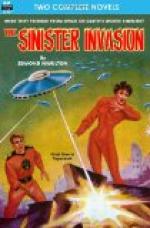Lockley regarded it, but without full attention. He was preoccupied with thoughts of Jill Holmes, and unfortunately she was engaged to marry Vale, who was also working in the park some thirty miles to the northeast, near Boulder Lake itself. Lockley didn’t know him well since he was new in the Survey. He was up there to the northeast with an electronic survey instrument like Lockley’s and on the same job. Jill had an assignment from some magazine or other to write an article on how national parks are born, and she was staying at the construction camp to gather material. She’d learned something from Vale and much from the engineers while Lockley had tried to think of interesting facts himself. He’d failed. When he thought about her, he thought about the fact that she was engaged to Vale. That was an unhappy thought. Then he tried to stop thinking about her altogether. But his mind somehow lingered on the subject.
At ten minutes to eight Lockley began to dress, wilderness fashion. He began by putting on his hat. It had lain on the pile of garments by his bed. Then he donned the rest of his garments in the exact reverse of the order in which he’d removed them.
At 8:00 he had a small fire going. He had no premonition that anything out of the ordinary was going to happen that day. This was still before the first Alaskan report. At 8:10 he had bacon sizzling and a small coffeepot almost enveloped by the flames. Events occurred and he knew nothing at all about them. For example, the Military Information Center had been warned of what was later privately called Operation Terror while Lockley was still tranquilly cooking breakfast and thinking—frowning a little—about Jill.
Naturally he knew nothing of emergency orders sending all planes aloft. He wasn’t informed about something reported in space and apparently headed for an impact point at Boulder Lake. As the computed impact time arrived, Lockley obliviously dumped coffee into his tin coffeepot and put it back on the flames.
At 8:13 instead of 8:14—this information is from the tape records—there was an extremely small earth shock recorded by the Berkeley, California, seismograph. It was a very minor shock, about the intensity of the explosion of a hundred tons of high explosive a very long distance away and barely strong enough to record its location, which was Boulder Lake. The cause of that explosion or shock was not observed visually. There’d been no time to alert observers, and in any case the object should have been out of atmosphere until the last few seconds of its fall, and where it was reported to fall the cloud cover was unbroken. So nobody reported seeing it. Not at once, anyhow, and then only one man.
Lockley did not feel the impact. He was drinking a cup of coffee and thinking about his own problems. But a delicately balanced rock a hundred yards below his camp site toppled over and slid downhill. It started a miniature avalanche of stones and rocks. The loose stuff did not travel far, but the original balanced rock bounced and rolled for some distance before it came to rest.




